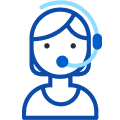A day in the life of online school for Gabbie and Josh with Elmater (mom and Learning Coach).
Favorite Subject(s)
Math, Vocabulary
Hobbies
Art, Dance
Favorite Subject(s)
History, Science
Hobbies
Science Fairs
Why K12?
Elmater wanted an option that would challenge her advanced students academically. Online school powered by K12 allows for Gabbie and Josh to work at their own pace. This gives Gabbie more time to work on her writing and Josh more time to work on his science experiments and award-winning science fair presentations.


Family Schedule
Learning Coaches typically spend between 4 to 6 hours each day with 3rd grade and other elementary school students like Gabbie, providing guidance and oversight. Middle schoolers like Josh tend to be more independent so the time expectation changes to 1 to 3 hours per day and is more verification that students are on track.
Elmater spends more one-to-one time with Gabbie since she's an energetic 3rd grader who needs more reminders to take breaks and refocus. With Josh being in 8th grade, more of the hands-on component has shifted to him so her role is more to make sure things get done. She says this is good training for both of them—for him to start becoming an even more independent learner and person.
Why did you switch to online school?

Curriculum
The number of classes students take varies per grade level and individual. For example, students in 8th grade like Josh typically take between 5–6 subjects each semester, with maybe 2–4 of those requiring scheduled, live classes. For elementary school students like Gabbie, it may be between 4–6 subjects, with 2–4 of those requiring live classes.
The other subjects are completed via self-guided assignments and skills labs in the K12 interactive online learning system.
In addition to core academic subjects like English, math, science, and social studies, K12-powered schools have a great selection of electives, including career exploration in some middle schools.
Classes schedules may vary considerably based on the individual student and their needs, state, and any special programs.
Why do you like online school?

Was there anything that surprised you about online school?
What is it like doing school at home with your whole family; how do you navigate all that as the Learning Coach?
Do you have any advice for families that might be considering online school?
More Q & A with the Family
What do your breaks look like during the day?
Elmater: I like the school class schedule because it is flexible enough to take the breaks my children need throughout the day. That helps teach them that, yes, frustrations happen, and you can take a minute to regroup, but the work still needs to get done by the end of the day or end of the week. It helps them learn how to self-regulate and get back on task. That's an essential set of skills they weren’t learning in their old schools.
Gabbie: Well, I like to do a lot of different things for breaks. I like to dance. Sometimes I want to make tea with mom or play piano with Josh. Other times I want to be outside, so we'll go for a walk or sit on the front porch.
Josh: We have a basketball hoop outside and when I get frustrated by something in class, I like to go out after and play for a bit. It helps me relax so I can think about the concept or problem differently. Sometimes my friends will come over to play basketball, which is fun.

First Name

Other Stories You Might Like

First Name

Learning with K12
Learning with K12
K12 powers a wide variety of educational options. including tuition-free public schools and tuition-based private schools. See what's available in your area.
These are the stories of real students attending K12-powered schools and their families. Content is a combination of direct quotes and summaries from in-person interviews. Their stories each reflect their experiences at their respective schools. Actual experience can vary by student and school. These pages are designed to reflect a typical day in the life of a student attending an online K12-powered school. Individual class schedules and requirements will vary by state, school, and the individual needs of each student.





